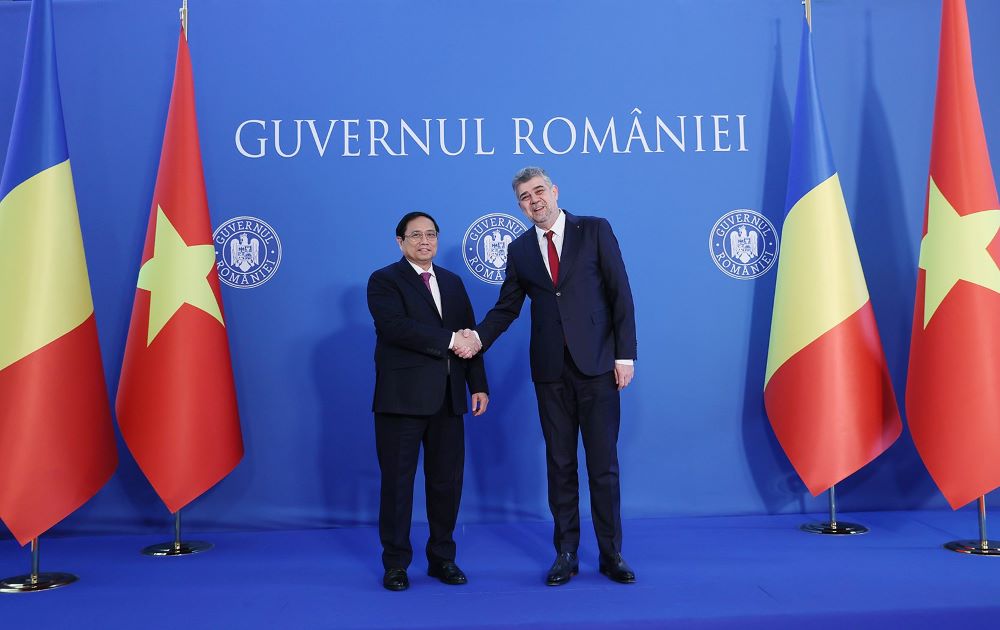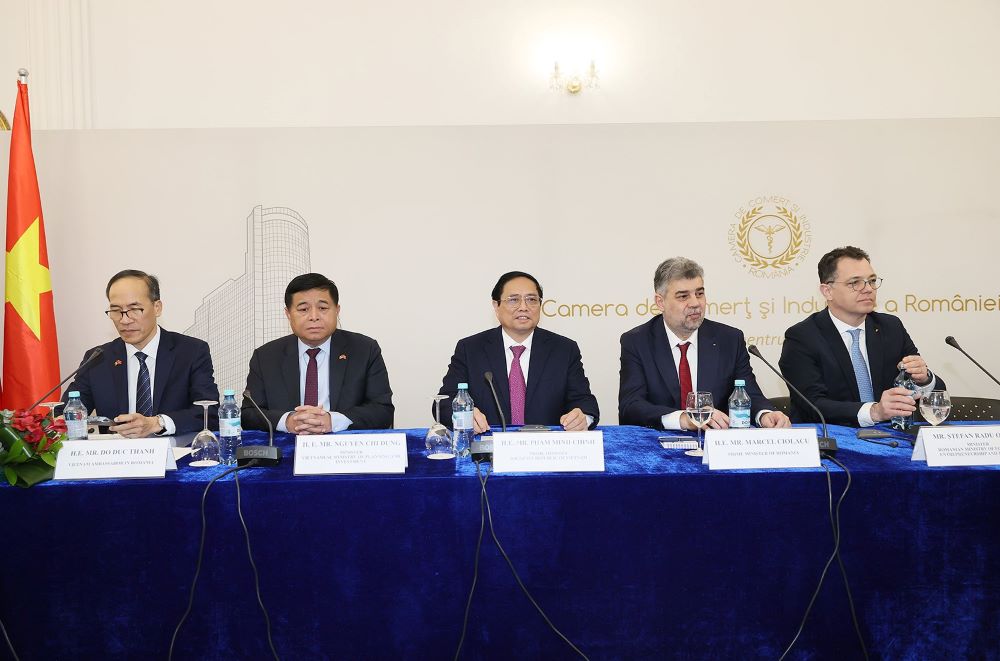Romania, Vietnam vow strong port cooperation
The two countries are seeking ways to make economic ties a key pillar in a relationship that enjoys “very high” political trust.
Romanian Prime Minister Ion Marcel Ciolacu has stressed the need to sign agreements on port cooperation between Romania and Vietnam to make economic ties typical of the 74-year relations.
| Vietnam’s Prime Minister Pham Minh Chinh and Romania's Prime Minister Ion Marcel Ciolacu in Bucharest on January 22. Photos: Nhat Bac/VGP |
Ion Marcel Ciolacu made the remarks during a meeting with Vietnam’s Prime Minister Pham Minh Chinh on January 22 during Chinh’s official visit to the European country.
The Romanian Prime Minister cited Haiphong Port in Vietnam as an example of the partnership and expected that future cooperation, including events, trade and investment would be held in port cities of the two countries, mostly Constanta, the principal port on the Black Sea.
He encouraged Vietnamese investors to seize Romania's unique prospects and will keep growing to lift the relations to new heights.
According to him, the port of Constanta, which serves as the Black Sea gateway to the European market, is a crucial component of the EU-Vietnam Free Trade Agreement. The ports of Constanta and the Danube will play a significant role on the expanding transcontinental routes between Asia and Europe.
Ion Marcel Ciolacu urged both countries to boost cooperation in trade, logistics, and tourism to turn Romania into a gateway for Vietnamese goods to Europe in the context that Romania will be a member of the Schengen Area, an area of 27 European countries that allows free movement without passports or any other type of border control, in March 2024.
He expressed his hope to make Romania a main partner in bringing Vietnamese goods to the European market as the country poses “unquestionable advantages, including a strategic location that provides access to the entire European continent.”
| The meeting of the two delegations on the same day. |
The way forward
In an effort to boost economic ties to be in line with good and trusting political relations, the two sides discussed measures at both meetings chaired by the two government leaders and at a business forum attended by hundreds of businesses from Romania and Vietnam.
Specifically, Romania is ready to provide logistical support for cooperation with Vietnamese ports to foster the expansion of transportation. The prime minister expected two-way trade to double to EUR1 billion in the coming years.
Ion Marcel Ciolacu considered agriculture and pharmaceuticals “strategic fields of cooperation” between the two countries with some pilot aquaculture projects in Romania using Vietnamese expertise.
He reiterated that the government of Romania will support its leading gas and power companies in cooperating with Vietnamese partners. He hoped that Vietnam would transfer the technology of Vietnam-made African swine fever vaccines so that Romania could produce and supply them to the European market. On this occasion, Vietnam donated Romania 10,000 doses of this kind of vaccine.
Pham Minh Chinh, for his part, thanked Romania for its support in Vietnam’s struggle for independence and national building and its training of more than 4,000 scientists, engineers, and scholars for Vietnam. Prime Minister Chinh is one of the Vietnamese students trained in Romania.
He also thanked Romania for giving Covid-19 vaccines, being the first European country to donate to Vietnam during the pandemic.
Chinh said the Government of Vietnam would work to make the country a gateway to ASEAN for Romanian goods.
He briefed the host on Vietnam’s economy with three principles for development, such as pursuing the socialist-oriented market economy; combining an independent and self-reliant economy coupled with integration; and putting people at the center of all economic development strategies with efforts to protect the environment and ensure equality.
To pursue those strategies, the country will focus on three key pillars, including refining the regulatory framework, intensifying investment in infrastructure, and improving manpower towards an economy with a refined legal framework, a well-invested infrastructure system, and smart governance.
| The two prime ministers at a business forum. |
To strengthen the comprehensive strategic partnership, the two countries signed 19 agreements on different sectors, namely foreign affairs, culture, music, education, and decentralization. At the same time, the two prime ministers agreed to boost cooperation in the field of political diplomacy by exchanging high-level visits via different channels to increase political trust and mutual understanding as a basis for multi-sectoral cooperation.
Trade and investment become a key pillar in the relations with efforts to make full use of bilateral cooperation mechanisms, notably the Inter-government Committee for Vietnam-Romania Economic Cooperation while promoting enforcement of the EU-Vietnam Free Trade Agreement (EVFTA) and the EU-Vietnam Investment Protection Agreement (EVIPA). On this occasion, Chinh requested Romania to mobilize the remaining European Union members to ratify EVIPA.
Education, a traditional cooperation field in the decades-long relationship, will be another key pillar of cooperation between universities specializing in high technology, information technology, agriculture, medicine, and pharmacy. Many agreements by the universities of both countries were signed in the presence of the two prime ministers. Chinh expected Romania to grant scholarships for Vietnamese students in culture, arts, and music.
In the field of culture, sports and tourism, they signed a number of agreements, including one on cultural cooperation for 2023-2025, on co-organizing cultural and artistic performances to reinforce people-to-people ties and to celebrate the 75th anniversary of bilateral relations in 2025.
They underlined the cooperation and support of multilateral mechanisms, such as the United Nations, the Asia-Europe Meeting (ASEM), and ASEAN – European Union relations to address regional and global challenges.
The two countries also stressed the importance of solving disputes peacefully by international laws, including the UN Convention on the Law of the Sea (UNCLOS) 1982 and supporting the substantive negotiations on the Code of Conduct (CoC) in the East Sea (known as South China Sea) between ASEAN and China.
While in Romania, Prime Minister Pham Minh Chinh met with Romanian President Klaus Iohannis, President of the Senate Nicolae Ciuca, and President of the Chamber of Deputies Alfred Simonis, all of whom affirmed that Vietnam is their most important partner in ASEAN.
| The Vietnam-Romania Business Forum attracts hundreds of firms from both sides. |












